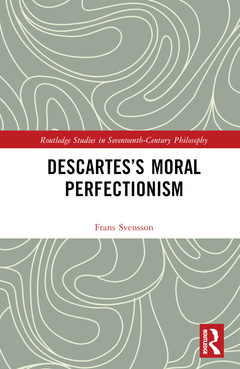Descartes’s Moral Perfectionism Routledge Studies in Seventeenth-Century Philosophy Series
Auteur : Svensson Frans

This book offers a novel and comprehensive interpretation of Descartes?s moral philosophy. In contrast to other influential interpretations, the book argues that the central tenet of his ethical thought is that each person ought to live in the way that is most conducive to their degree of overall perfection.
While Descartes?s ethical thought has attracted only a very modest amount of attention among scholars, this book demonstrates that it constitutes an important and integral component of his philosophical project as a whole. It argues that Descartes?s ethics constitutes a form of moral perfectionism. In the Cartesian picture, we satisfy this requirement of perfection by using our free will well in all our conduct, something which is also necessary for obtaining happiness for ourselves. To be guaranteed happiness, however, we need to acquire the virtue of generosity, which, besides a habit of using one?s free will well, entails a habit of being attentive in one?s thought to various truths about oneself and about the world we live in. Descartes offers an interesting attempt to make living well depend entirely on ourselves and not on fate or fortune. He also leaves room for the presence of passions within such a life and for acknowledging that even fully virtuous persons? lives may differ in their degrees of overall perfection.
Descartes?s Moral Perfectionism will appeal to scholars and graduate students working on Descartes, the history of early modern philosophy, and the history of ethics.
Introduction 1. Good and evil 2. Descartes’s conception of virtue 3. Descartes’s moral perfectionism 4. Happiness 5. Cartesian generosity 6. Cartesian generosity, the highest and most perfect morality, and the morale par provision
Frans Svensson is Senior Lecturer in philosophy at the University of Gothenburg, Sweden. His work has appeared in journals such as History of Philosophy Quarterly, Journal of Ethics, and Utilitas. He is the co-editor, with Martina Reuter, of Mind, Body, and Morality: New Perspectives on Descartes and Spinoza (Routledge, 2019).
Date de parution : 04-2024
15.2x22.9 cm



